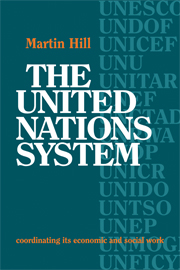Book contents
- Frontmatter
- Contents
- Foreword
- Preface
- Introduction
- Part I The problem of coordination and its setting
- Part II Some conclusions and suggestions
- 8 The context and the perspective
- 9 The role of the Economic and Social Council
- 10 Other aspects of UN–agency relationships
- 11 The functioning of the Administrative Committee on Coordination
- 12 Some structural and organizational issues
- 13 Expansion, adaptation, concentration and the responsibilities of the General Assembly
- Postscript
- 1 Abbreviations and glossary of institutions
- 2 Principal organs of the United Nations (General Assembly, Economic and Social Council and Secretariat) with main subsidiary organs directly concerned with economic and social cooperation and coordination (Status as of Spring 1976)
- 3 Chart of agencies related to the United Nations
- 4 Regional and branch offices of organizations of the United Nations System
- 5 Chart of the United Nations System
- 6 A new UN structure for global economic cooperation–list of conclusions and recommendations of the Group of Experts, prepared by the Secretariat
- Notes
- Index
13 - Expansion, adaptation, concentration and the responsibilities of the General Assembly
Published online by Cambridge University Press: 05 November 2011
- Frontmatter
- Contents
- Foreword
- Preface
- Introduction
- Part I The problem of coordination and its setting
- Part II Some conclusions and suggestions
- 8 The context and the perspective
- 9 The role of the Economic and Social Council
- 10 Other aspects of UN–agency relationships
- 11 The functioning of the Administrative Committee on Coordination
- 12 Some structural and organizational issues
- 13 Expansion, adaptation, concentration and the responsibilities of the General Assembly
- Postscript
- 1 Abbreviations and glossary of institutions
- 2 Principal organs of the United Nations (General Assembly, Economic and Social Council and Secretariat) with main subsidiary organs directly concerned with economic and social cooperation and coordination (Status as of Spring 1976)
- 3 Chart of agencies related to the United Nations
- 4 Regional and branch offices of organizations of the United Nations System
- 5 Chart of the United Nations System
- 6 A new UN structure for global economic cooperation–list of conclusions and recommendations of the Group of Experts, prepared by the Secretariat
- Notes
- Index
Summary
Year-by-year the areas in which the United Nations System is active expands and the work takes on new forms. Already there is scarcely any aspect of human life and environment which is the concern of Governments that is not within the programmes of the system: the subject of study, of exchanges of experts and expertise, of standard setting, of assistance programmes. And a host of new problems await international action, from the control of the disposal of nuclear waste to water utilization and resources, from the Law of the Sea and the Ocean Floor, to the attack on the vicious circle of ignorance, poverty and disease affecting two-thirds of mankind. While it reflects the innate strength of the United Nations System, the fact that far too much is being attempted at the same time, that there are far too many committees than can be properly manned by national delegates and supported by national administrations, and far too much pressure to find quick ‘solutions’ is an inevitable source of administrative weakness. In most instances, there is little enthusiasm on the part of the Membership as a whole to accept the financial obligations involved in new programmes. The line of least resistance is to create a new fund to which interested States may contribute and through which a special staff can be recruited and financed. Hence, as we have seen, the proliferation of semi-autonomous units and funds, the consolidation or rationalization of which it has become a priority task to bring about.
- Type
- Chapter
- Information
- The United Nations SystemCoordinating its Economic and Social Work, pp. 144 - 152Publisher: Cambridge University PressPrint publication year: 1978



